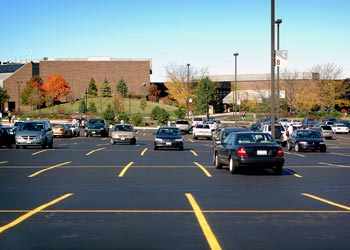
More and more commercial property owners are investing in porous asphalt for stormwater management.
As the name suggests, porous asphalt is filled with pores that allow water to seep through asphalt pavement and enter the soil where it can be filtered of contaminants.
Porous asphalt was designed to mimic the way before it flows into waterways, which is better for humans and the environment.
Here are the main differences between permeable and standard asphalt.
Stormwater Management
When water is unable to soak into the ground, it flows across the surface until it reaches a sewer system or waterway.
One of the biggest differences between porous and standard asphalt is stormwater management, which affects water quality and flooding.
When it rains, water seeps into the soil where it is filtered of contaminants. But urban areas that feature parking lots, driveways, roads, and rooftops, make it difficult for water to seep into the soil. As a result, the amount of stormwater runoff increases significantly and can even cause flooding.
Porous asphalt reduces how much water goes into storm sewers while replenishing water tables.
Standard asphalt is a hard surface, which means stormwater is unable to penetrate. While this is great for the lifespan of asphalt parking lots, it may not be good news for the environment.
Runoff from asphalt surfaces picks up contaminants along the way and doesn’t get filtered through the soil the way nature intended.
Porous asphalt parking lots, on the other hand, have been shown to filter out contaminants like solids, grease, and oil.
Related: How to Prevent Standing Water in Your Parking Lot >>
Lifespan
The average lifespan of an asphalt parking lot is 20 years. But porous asphalt parking lots have been known to last longer.
Perhaps one of the best examples of porous parking lots is located outside the Walden Pond State Reservation in Massachusetts. While the porous parking lot was installed in 1977, it still remains in good condition.
One of the most common causes of standard pavement damage is water infiltration. Since porous pavements are designed to filter water, this isn’t a problem.
Cost
Porous asphalt costs more to install than standard asphalt because it requires a stone recharge bed underneath the surface layer.
But the cost of porous asphalt must be compared with alternatives before determining the final cost. For example, if you were planning on needing a detention basin to handle stormwater runoff, the cost of porous asphalt installation is less expensive.
An asphalt paving contractor can help you determine if porous pavement is the right choice for your property.
Request a Free Estimate
A-1 Asphalt is an asphalt paving contractor serving Greater Grand Rapids. As such, our team would be more than happy to help you with your next project. Whether you need to re-pave a parking lot or driveway, you can count on our crew for professional results.
To request a free estimate for an upcoming project, call (800) 871-4401. We’d be more than happy to help!
This blog post has been updated.